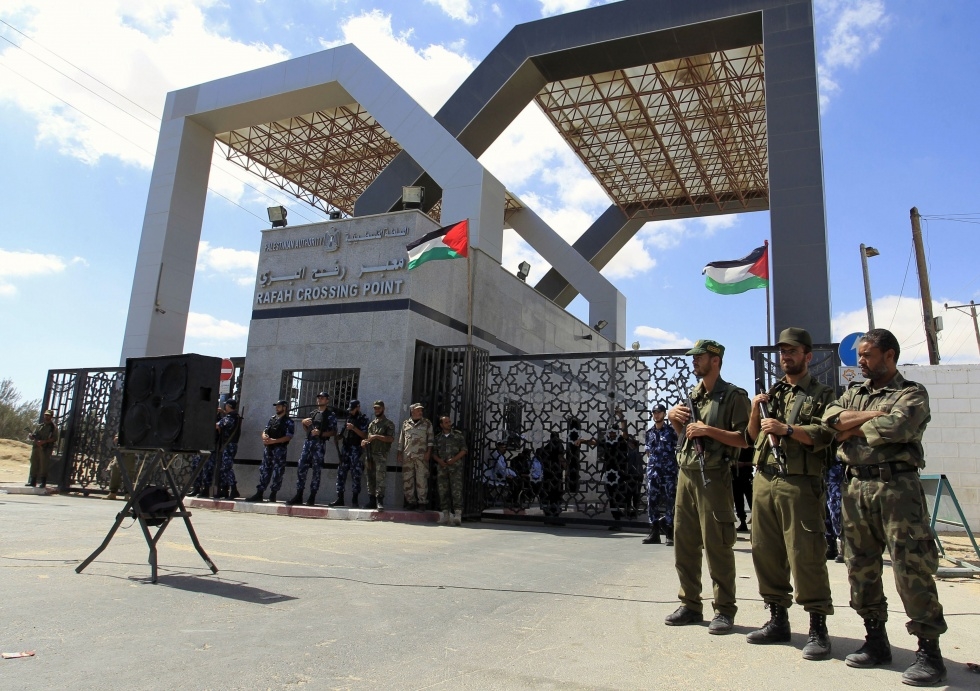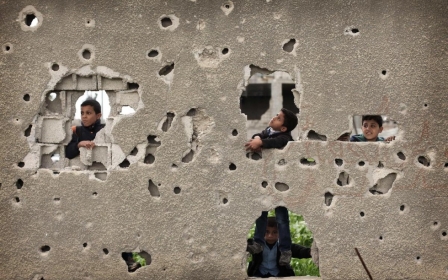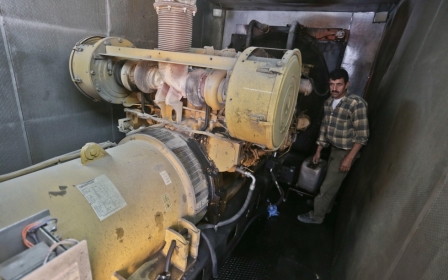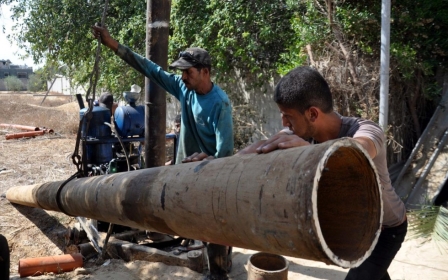Rafah closure punishes Palestinians in Gaza

RAFAH, Gaza Strip – Abu Sufian’s 23-year-old son, Sami, can’t get home.
After flying to Turkey last month to receive medical treatment for an injury sustained during the 51-day war in Gaza this summer, Sami is now stranded at the Rafah border, waiting – and hoping – that the crossing between Egypt and his home country, Gaza, will soon re-open.
Egypt closed the crossing on 25 October after attacks by militants killed 33 Egyptian soldiers, an assault that prompted Cairo to declare an emergency in the area.
Gaza's Ministry of Interior insists that the besieged coastal enclave now faces a “serious humanitarian crisis” as a result.
“It seems to be ongoing, never-ending, that we, the people of Gaza, remain trapped and blamed for everything. If a sheep goes missing in Somalia, we’ll be blamed," Abu Sufian told Middle East Eye.
Abu Sufian said that his son is out of money and has nowhere to go. “He's stuck outside, day and night, can only bear weight on one leg, [and] has no money to buy extra food or drink,” added Abu Sufian, who has been standing on the Gazan side of the Rafah border gate patiently waiting for his son.
As a consequence of Egypt’s security clampdown 6,000 Palestinians are currently stranded on the Egyptian side of the border with Gaza, according to Iyad al-Bizm, a spokesman for Gaza’s Interior Ministry.
Hundreds more are also trapped in third countries, many with expired visas sleeping on airport floors and inside terminal buildings.
Another 2,000 people suffering from medical problems including kidney failure, cancer and blood-related diseases seek urgent treatment or further diagnosis in Egypt, said Ashraf al-Qidra, a spokesman for the Gaza Health Ministry.
Egypt has ignored repeated pleas by Gaza’s Health Ministry for the Rafah crossing to be reopened in order that Palestinian patients be given access to specialised health care not available in Gaza
“2,000 patients need to get outside to specialized hospitals in Egypt,” Qidra said.
Nearly a third of all Gaza’s medical supplies used to enter the territory on aid convoys through the Rafah crossing, according to Gazan health officials. With that crossing now shut approximately 12,000 people are awaiting surgical operations due to a lack of medical supplies.
A few hundred Gazan patients are still able to get into Israeli and West Bank hospitals for health care treatment with financial assistance from the Palestinian Authority. But, according to Qidra, this cannot be a solution to the overall problem.
‘A deliberate political choice?’
Egypt's military is pressing ahead with a one-kilometer buffer zone with Gaza, partly to clamp down on the smuggling of arms across the border, a business that help finance Hamas, which governs the enclave.
In creating the zone Egypt has destroyed hundreds of homes along the Egyptian side of border.
Last week an Egyptian lawyer, Nasser Hassan Reda, called on the government to “permanently shut” the Rafah crossing.
The call came after Egypt accused Hamas of being involved in two gruesome suicide bomb attacks on Egyptian troops last month, a charge the Palestinian group has denied.
Shortly after the attack an Egyptian presidential decree was issued imposing a three-month-long state of emergency in the Sinai and vowing to carry out a large crackdown on militants.
“The army and the police will take all necessary measures to tackle the dangers of terrorism and its financing, to preserve the security of the region... and protect the lives of citizens,” the presidential decree said.
The situation remains tense between the Egyptian government and Hamas, an ally of the outlawed Muslim Brotherhood. Since Morsi's oust, the new authorities have decided to hit back at Hamas, hoping to drive a rift between the two groups. In 2014, the Egyptian authorities kept the Rafah crossing closed for 211 days, and open for 115 days.
“There is no justification for closing [the] Rafah crossing, which poses no security threat or burden on Egypt,” Bizm, the interior ministry spokesperson, said.
In Gaza, Palestinians have demonstrated in front of the closed border gates, demanding freedom of movement and access to medical care.
Abu Sufian counts his son’s continued inability to return to Gaza as unfair punishment.
"I don’t call this destiny, it is a deliberated political choice to punish the people of Gaza,” he said. “When a new patient dies due to lack of medication or care, we know that the international community has failed us again.”
Lack of medical supplies
Israel and Egypt’s blockade of the Gaza strip officially began in 2006 when Hamas seized control of the territory but Israel has restricted the movement of goods in and out of the territory since the early 1990s.
“These crossings are the only lifeline for the Gaza Strip and a window to the outside world,” said Bizm.
Today Israel only allows Palestinians to exit Gaza through the Erez crossing in “exceptional humanitarian cases” or with “urgent medical cases".
According to the Israeli human rights group Gisha Israel currently allows approximately 4,000 Palestinians to leave Gaza each month through Erez, compared to 500,000 in September 2000.
One result of this is that Gaza has suffered from a chronic shortage of medical supplies for several years, and many doctors have been unable to leave Gaza for medical training. If they had, Abu Sufian believes his son would not be across the border alone and injured.
New MEE newsletter: Jerusalem Dispatch
Sign up to get the latest insights and analysis on Israel-Palestine, alongside Turkey Unpacked and other MEE newsletters
Middle East Eye delivers independent and unrivalled coverage and analysis of the Middle East, North Africa and beyond. To learn more about republishing this content and the associated fees, please fill out this form. More about MEE can be found here.




